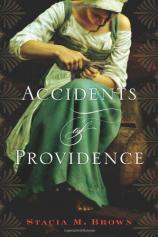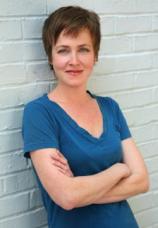Reading Group Guide
Discussion Questions
Accidents of Providence

1. What do we know about Rachel Lockyer? “They knew her less for who she was than for who and what she was not. She was not a matron. She was not a mother. She was not well educated. She was not much of a Christian” (p. 39). Was she any of the things others thought she wasn’t? What did Rachel believe in? By what standards did she define herself? By what sort of standards do you define yourself and others?
2. Why was the 1624 Act to Prevent the Destroying and Murdering of Bastard Children (a copy of the act is included at the front of the book) created? What are the details of it? What are its flaws and its loopholes? Was it right for Rachel to be prosecuted according to its writ?
3. Criminal Investigator Thomas Bartwain firmly believes that "The law is itself the end. The law is beautiful; the law is order. If we have not law, we have nothing" (p. 94). Yet by the end of the novel he admits that "the law is wrong" (p. 179). In the course of reaching this conclusion Bartwain is influenced by a variety of experiences. Beyond his assessment of Rachel's case, he had some meaningful conversations with his wife, a distracting and distressing battle with the mice in his house, and increasingly severe physical ailments. What do you think most influenced his change of opinion? What do you think was his role in the novel?
4. Compare the infant-murder trials of early modern England to the witch hunts of colonial North America. What were their religious roots? Did they emphasize punishment for sin, or for the concealment of sin? What does that distinction mean?
5. “You are a mother when you have lost something. When you have felt the change and cannot hold it,” Mary tells Rachel (p. 183). When do you believe someone becomes a mother? Was Rachel a mother? How does her experience of motherhood differ from the other women in the book?
6. On page 72, Rachel and Walwyn have an argument about the punishment of a boy convicted of stealing food. Rachel doesn't seem to think it's as "barbaric" as Walwyn claims. Did her attitude on this issue --- and other political issues the Levelers take up --- surprise you? What did you think of Rachel’s political views in general and how they, and her place in this tumultuous political period, were presented?
7. Rachel’s friendship with Elizabeth Lilburne, her place in Mary du Gard’s home and work, and her relationship with her mother all place her within reach of support from other women. Does she get this support? In what ways? Does this story make you think further about the level of responsibility we should feel for each other’s lives and welfare? For the lives of the children in our communities?
8. On page 176, in a final desperate attempt to save her, Walwyn offers his life in exchange for Rachel's. Why does Bartwain believe Walwyn's life is "worth more"? When do you think one person’s life is worth more than another’s? Would your opinions be different if you lived during the period in which this book is set?
9. Rachel Lockyer has few connections to the world around her: her only strong family tie was to her brother Robert. How do you think Robert's death (described in chapter eight) affected her later decisions? What about her estranged relationship from her mother? How does Rachel’s position in the community --- her work as a tradeswoman, her unmarried status --- affect how she is perceived by the other characters in the book? By her accusers and the public?
10. How would you characterize the romantic and married relationships in the book? What is the status of wife and woman in this period? What is the author telling us about the period through these relationships, and how do they differ from such relationships in contemporary America? Is this a feminist book?
11. Were you frustrated by Rachel's refusal to explain what had happened or to defend herself to Bartwain or in court? Why do you think she kept silent?
12. “You saved me,” Walwyn tells Rachel. “You are wholly good” (p. 152). How did Walwyn and Rachel save each other? Do you believe Rachel is good? Can anyone be “wholly” good?
13. Mary du Gard plays a small but vital role in Rachel's saga. The novel begins and ends with her perspective. Why do you think the author chose to have Mary bookend the story?
14. Are there parallels between the birth and death of Rachel's child (p. 209) and her own "death"? If so, do you draw any significance from those parallels? What do you make of the role of miracles in this story, religiously, politically, and mythically?
15. “…for whatever green shoots might by some accident of providence have thrust their spindly arms up from the barren soil overnight” (p. 73). Did you notice “accidents of providence” in the book? Is this an apt title? What does it mean for providence to admit to accidents, here and in your own life?
Accidents of Providence
- Publication Date: February 14, 2012
- Hardcover: 272 pages
- Publisher: Houghton Mifflin Harcourt
- ISBN-10: 0547490801
- ISBN-13: 9780547490809








